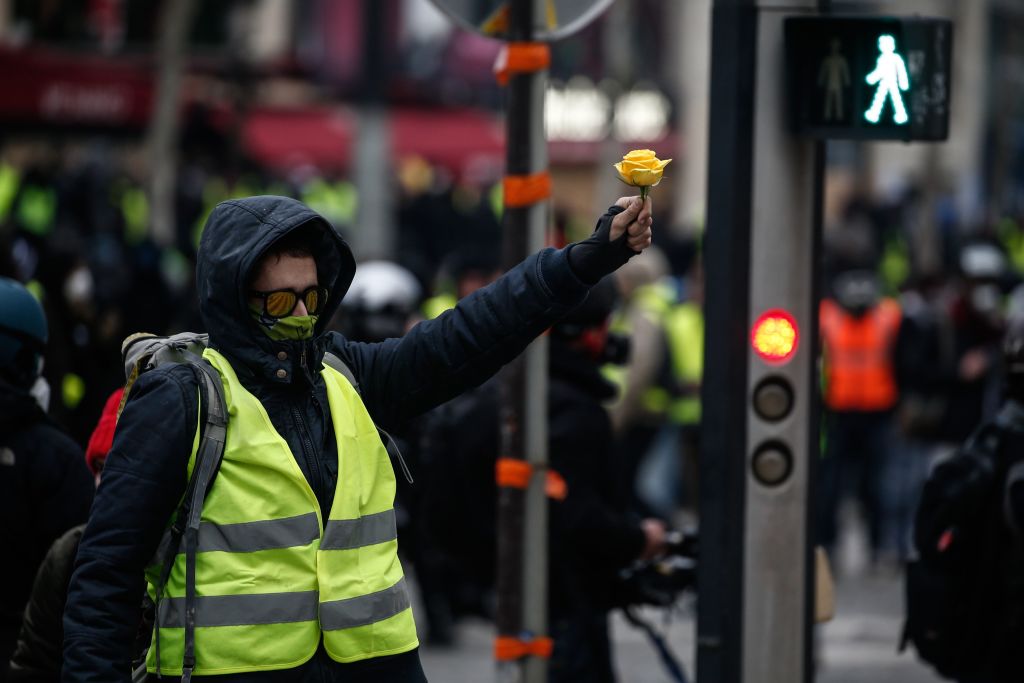The eminent historian Emmanuel Todd was on the radio in France last week. He had much to say, none of which would have made for easy listening at the Élysée Palace, particularly his warning that Emmanuel Macron is facing a coup d’etat that has been fomenting for years.
Todd believes that fundamental to the rise of the Yellow Vest movement is what happened in 2005. That was the year France, in the words of the Guardian at the time, “decisively rejected the new European constitution”. The ‘non’ votes were 54 per cent (out of an overall turnout of almost 70 per cent) and jubilant campaigners demanded the resignation of Jacques Chirac as they celebrated in the Place de la Bastille. An ashen-faced president admitted the result was a shock but conceded that voters had spoken “democratically” and taken a “sovereign decision”.
Equally stunned was Chirac’s foreign minister, who before the referendum vote had spoken boldly of the need for a Yes vote. Europe, he had said, “is a political force. It must speak with its own voice and have its own identity for it to count in the world. That is what Europe is about for Europeans.” After the vote, the foreign minister lamented that “this is the first time in 50 years that the French and Germans have diverged in Europe on a fundamental issue. Without this constitution, Europe is broken down politically.”
The name of that minister was Michel Barnier.
For two years after the French ‘no’ vote there was an impasse, and then in May 2007 Nicolas Sarkozy was elected president. It would be hard to find a more vulgar man than he who was nicknamed ‘Bling Bling’; one of Sarkozy’s first acts was to ride roughshod over the wishes of the 54 per cent by committing France to the Lisbon Treaty. “The difference between the original Constitution and the present Lisbon Treaty is one of approach, rather than content,” admitted one of its architects, the former French president, Valéry Giscard d’Estaing. In other words this time the advice of the French people wasn’t sought.
Sarkozy has always had trouble concealing his distaste for the little people, once describing them as “yokels” and on another occasion as “scum”. Yet Sarkozy is said to be considering a comeback in order to rescue France, as is Ségolène Royal, the Socialist candidate he defeated in the 2007 election. Increasingly, the French political class is beyond parody.
Royal’s defeat so shook the Socialists that they spent several years examining how they could win the 2012 election. A left-wing think-tank, Terra Nova, advised them to forsake the white working-class for well-educated metropolitans and ethnic minorities. “The France of tomorrow is above all united by cultural and progressive values,” reported Terra Nova in 2011. “It wants change. It is tolerant, open, optimistic and inclusive…it is opposed to an electorate that defends the present and the past against change.”
The left had been the most vociferous in opposing the 2005 European Constitution but they were now being abandoned, as New Labour had moved away from its traditional electorate in the years following Tony Blair’s victory in 1997. One of the creators of New Labour was Peter Mandelson, Britain’s European commissioner for trade in 2005. He was furious with the French rejection of the Constitution, blaming it on voters’ failure to “understand the modern world” and the fact that “they don’t like the liberal trend of policies.”
The Yellow Vests don’t like the liberal trend of policies. “The middle and working classes are in a state of insecurity economically and culturally,” explained the philosopher Alain Finkielkraut last week when discussing the protest movement. Immigration, Islam, gay marriage and assisted procreation for lesbian couples trouble millions of voters but if they raise any objections they are either ignored or insulted.
Emmanuel Macron will address the nation tonight in an attempt to end the crisis. But the Yellow Vests don’t want to listen. The ones I spoke to on Saturday, and the ones I’ve heard in the media, say the same thing: a new Constitution is needed and that means a new relationship with the European Union is required. There was talk in Sunday’s papers of the Yellow Vests forming themselves into a political force for May’s European elections.
Whatever Macron says and does in the coming days won’t alter the fact that the protests have weakened irrevocably his authority. To deny this would be dangerous for him and for the EU; the era of Europe’s political elite treating their working-class electorate with scorn is over. As Saturday’s protests in Belgium and Holland demonstrated, yellow fever is highly contagious and could easily afflict the entire continent.







Comments